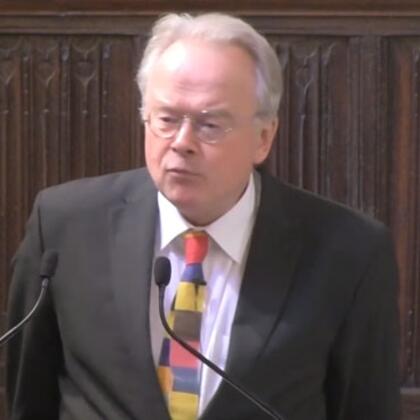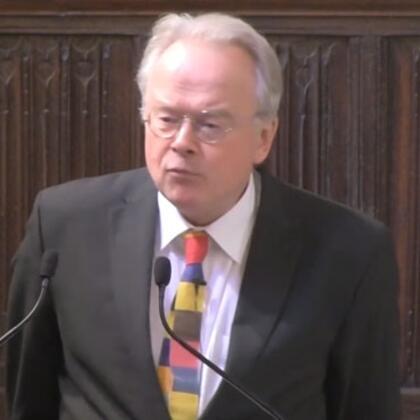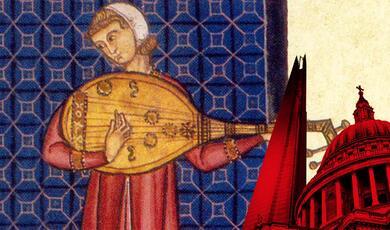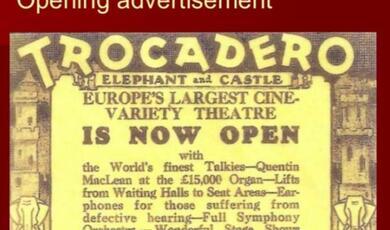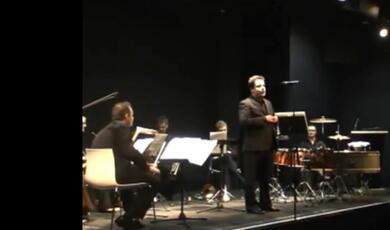Sullivan Song Day: The Lost Chord and other songs
Share
- Details
- Transcript
- Audio
- Downloads
- Extra Reading
An examination of The Lost Chord and the other songs by the same poet, Adelaide A. Procter.
Download Transcript
24 September 2011
The Lost Chord and other songs
Professor David Owen Norris
My second segment concerns itself mainly with the songs of Adelaide Anne Procter, who died at the age of 36, in 1864, after a life of good works. She was the most purchased poet in the country after Tennyson, so she was extremely famous. She was a contributor to Dickens’ magazine Household Words. Dickens wrote a very admiring obituary of her, in which he, nonetheless, notes that her poetry is the opposite of humorous. He says, “Those who know her only from her poetry will perhaps be surprised to learn that she was actually delightful and humorous”. He goes on to outline her jolly qualities, but it must be said that her poetry is very serious. She regarded herself as a writer of verses, and thought that it was her father, Benjamin, who was the poet. She became very abashed by her bestselling status, partly because she was embarrassed for her father’s sake.
We generally tend to laugh at Victorian poetry, perhaps because the Victorians had no great sense of irony. Our current culture is so saturated with irony that we are at the opposite pole. If somebody sings, for example, that they were seated one day at the organ, we tend to laugh, but this was a commonplace setting for the Victorians.
I shall first look at “Will he come?” This poem is about a woman dying of tuberculosis. We know this because she has got a flushed face and she is sinking fast and so on. It reminds me that many commentaries on Verdi’s La traviata find it funny that the the ‘fallen woman’ is suffering from tuberculosis. It is a little bit incongruous, I suppose, for an opera singer to be impersonating somebody with terminal tuberculosis, but that apart, it is not actually very funny.
The other thing that we ought to bear in mind, of course, is that I am about to look at a song about a child starving to death. We should not necessarily think of this as a subject far removed from us, if we consider the terrible things going on in Somalia and Ethiopia. I hope that we have all got to a position where we have outgrown our attitude to silly songs about women wishing that their children were dying. It is to be hoped that we might have grown up a bit in our appreciation of these Victorian sentiments, realising that these sentiments are sincerely felt and rather well-expressed.
Adelaide Procter died in 1864, and Sullivan wrote his first Procter song in 1865. I think it not unlikely, therefore, that this is something of a tribute to the poem. “Will he come?” is about a woman dying of tuberculosis, which is what Procter died of. This is not just an invented scenario, conjured up just to wring the heart; this is the poet looking ahead and seeing her own death, as it were.
That being said, it is not the best of the Procter songs - we all know which one is the best. But it is rather good. It begins with these descending scales. This is the introduction…
[Plays]
There is a hairpin in that bar.
[Plays]
There is the word “crescendo” in that bar.
[Plays]
Therefore, I play it like that…
[Plays]
Hairpin down…
[Plays and sings]
Sullivan has done what he very frequently does at this point: he has given us something of a recitative at the beginning, and now gets into a beautiful tune.
[Plays and sings]
Notice that bass interruption that I drew your attention to in “The Sailor’s Grave”.
[Plays and sings]
The second verse, as is very often the case, is very similar. This is the dying woman: “Calmly still, she strove to speak, yet her voice grew faint and trembling and the red flushed in her cheek.”
And then there is a marvellous surprise!
[Sings and plays]
“Wake me early in the morning, wake me early, mother dear”. This is just one of many poems about dying girls, but I feel it has a certain poignancy in the hands of Procter.
Suddenly, we have this…
[Plays and sings]
Now, we are in a weird key! We started in D major, and we are now in F sharp major. This an almost Schubertian modulation, but we cannot possibly think that we are in a song by Schubert, because the music goes…
[Sings and plays]
There is then a pause over “rest”, and it says “silent”. Again, this is Sullivan the performer; you get this beautiful phrase coming back…
[Sings and plays]
Those notes with accents at the end are surely intended to be a passing bell. You hear a lot of bells in Sullivan’s music. The passing bell was such a familiar part of 19th Century life that Schubert wrote a whole song called “The Passing Bell”, which has a bell ringing away in it - so, not a comical moment at all.
There is a very interesting moment of re-harmonisation in the last refrain…
[Sings and plays]
That is what we have had so far. This time, we have…
[Sings and plays]
That change of chord pushes us through the phrase in a different way.
I am now going to skip to “The Lost Chord”, and it is only right that I here say something about Thomas Helmore. Helmore was the Master of the Choristers at the Chapel Royal and, as Sherlock Holmes points out, he was the only man who knew everything about medieval music in the time that Sullivan was a choirboy. In fact, it was in a volume published by Helmore, with the Reverend J. M. Neale in the late-1850s, that “Good King Wenceslas” made its first appearance.
It is said of Reverend Thomas Helmore: “His beautiful voice was brought to perfection by systematic practice... In intoning the service, his now highly cultivated voice soon placed the Reverend Thomas Helmore at the head of the list of cathedral vicars or minor canons in England.” Sir George Elvey, attending on a day when there was no singing except the monotone service, said: “I never in my life heard anything to approach the grandeur and solemnity of that monotone service.” By simply chanting on a single note, Thomas Helmore showed a genius that could impress one of the great church musicians of the day.
The opening of “The Lost Chord” is simply versicles and responses. As a result, it needs to be sung in the way we might imagine that Helmore would have sung his versicles and responses. I tend to think that this would probably not have been strictly rhythmic because Thomas Helmore was one of the founders of the Plainsong Society.
I think that this is why Sullivan’s work is so full of repeated notes, because he spent his formative years listening to a master of the monotone.
What we have in “The Lost Chord” is a combination of Sullivan’s childhood experience of a great master of chanting with an otherworldly “Amen”, which is in a different tonal space altogether. This reminds us that “The Lost Chord” is actually “A Lost Progression”. It is not the one chord; it is the two chords that he has lost. This may explain why he changed the title. Procter’s title for it is “A Lost Chord”, whereas Sullivan calls it “The Lost Chord”. The obituary writers of Procter called it the “Lost Chord”, without the “The”. So, we would be quite right in saying “Sullivan’s Lost Chord”, not “Sullivan’s The Lost Chord”. But he did change the title, and I wonder if he did so partly because he knew that it was a progression, not a single chord.
About ten years ago, I was once approached by a Swedish composer, who said that he had found the most wonderful lyric to set to music. He said, “It’s an English lyric, I think it’s absolutely wonderful, it’s just crying out for music - I’m going to set it for organ and trumpet... It’s called “The Lost Chord”.” I said, “Well, you do know that it has actually been set…” He said, “I don’t care! I don’t care! I think it’s a wonderful poem”.
Thank you.
© Professor David Owen Norris 2011
Part of:
This event was on Sat, 24 Sep 2011
Support Gresham
Gresham College has offered an outstanding education to the public free of charge for over 400 years. Today, Gresham plays an important role in fostering a love of learning and a greater understanding of ourselves and the world around us. Your donation will help to widen our reach and to broaden our audience, allowing more people to benefit from a high-quality education from some of the brightest minds.


 Login
Login




